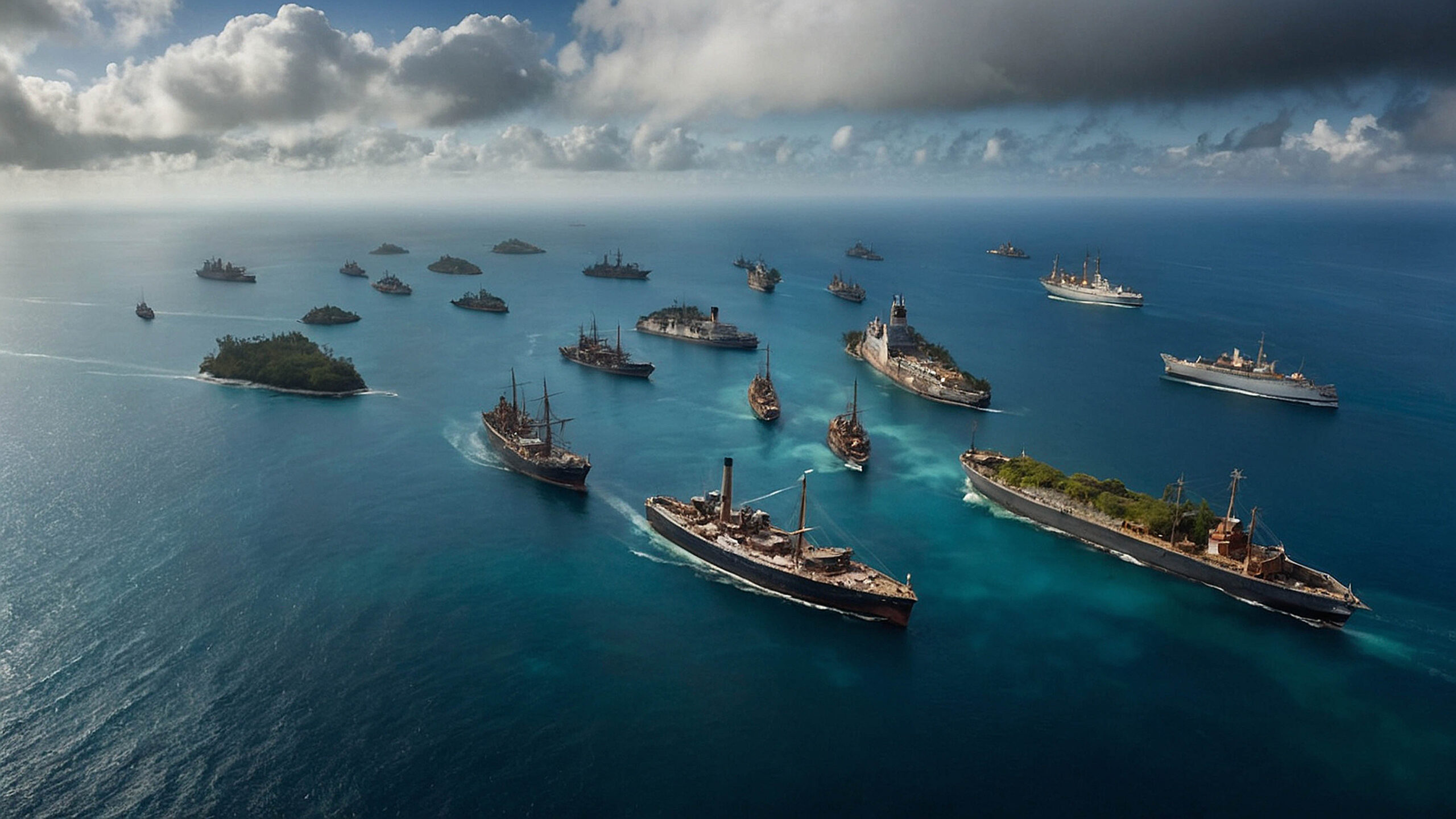Strengthening Indo-Pacific Marine Cooperation to Address Climate Change and Biodiversity Loss
Strengthening Indo-Pacific Marine Cooperation.
The Indo-Pacific region, known for its rich marine biodiversity and vast coastline, is particularly vulnerable to the twin crises of climate change and biodiversity loss. These interconnected issues present profound challenges, not only for environmental sustainability but also for food security, public health, and economic stability. Rising ocean temperatures, frequent extreme weather events, and the destruction of coral reefs are just a few of the pressing threats that call for immediate, coordinated action among Indo-Pacific nations. Addressing these crises requires a robust, multi-dimensional approach, including scientific research, the expansion of Marine Protected Areas (MPAs), the application of nature-based climate solutions, community involvement, and enhanced financial and technological support.

The Urgency of Climate Change and Biodiversity Loss
The Indo-Pacific’s unique ecosystems—spanning coral reefs, mangroves, and seagrass beds—not only support a wide array of species but also function as significant carbon sinks, which help in regulating the global climate. However, the impacts of climate change threaten these ecosystems, with coral reefs experiencing widespread bleaching and mangroves at risk of disappearing by 2070 in regions with low tidal ranges. Rising sea levels pose a particular danger to island nations and low-lying coastal areas, leading to the displacement of communities and intensified regional tensions. The ongoing destruction of these marine habitats exacerbates biodiversity loss, which could have long-term repercussions on food security and economic activities in the region.
Enhancing Scientific Research Networks and Data Sharing
A critical first step in managing these environmental crises is the establishment of strong scientific research networks and effective data-sharing mechanisms. Collaborative research allows Indo-Pacific countries to monitor vital indicators of ocean health, including shifts in species distribution, temperature fluctuations, and coral health. Organisations like the Association of Southeast Asian Nations (ASEAN) and the Asia-Pacific Economic Cooperation (APEC) can play instrumental roles in creating a centralised data platform, enabling real-time information exchange that informs adaptive strategies.
Such a data-sharing system provides the foundation for early warning systems, allowing countries to better prepare for and respond to changing oceanic conditions. By consolidating research efforts across borders, Indo-Pacific nations can develop a collective understanding of environmental changes and act accordingly to protect the region’s biodiversity.
Expanding and Strengthening Marine Protected Areas (MPAs)
The establishment of Marine Protected Areas (MPAs) is vital for safeguarding biodiversity and enhancing ecosystem resilience to climate change. The Coral Triangle, which spans Indonesia, the Philippines, and Malaysia, is an example of successful transboundary collaboration in marine conservation. Expanding MPAs across the Indo-Pacific and establishing cross-border networks can protect migratory species, preserve ecosystem connectivity, and prevent overfishing. These protected areas also act as natural barriers against extreme weather, supporting local economies by protecting fisheries and tourism resources that rely on healthy marine environments.
Expanding MPAs helps Indo-Pacific countries meet biodiversity targets set by international agreements, including the Kunming-Montreal Global Biodiversity Framework. Creating transboundary MPAs also fosters regional solidarity, reinforcing collective responsibility for marine conservation. With these protections in place, countries can manage their shared waters sustainably, contributing to long-term ecological stability.
Implementing Nature-Based Ocean Climate Solutions
Nature-based solutions, which utilise ecological processes to address environmental challenges, offer an effective means of climate adaptation and mitigation in the Indo-Pacific. Initiatives like mangrove restoration, coral reef rehabilitation, and seagrass bed expansion contribute to carbon sequestration while also enhancing ecosystem resilience. The Pacific Mangroves Initiative, for example, led by the Pacific Islands Forum, has demonstrated the success of using mangroves to protect coastlines from storm surges and buffer local communities against rising sea levels.
To support such solutions, the United Nations Economic and Social Commission for Asia and the Pacific (UNESCAP) launched the Ocean-Based Climate Action (OBCA) initiative in 2023. This initiative encourages countries to integrate marine ecosystems into their climate strategies. Regional climate financing mechanisms can further support these nature-based projects, ensuring that countries have the resources necessary to implement effective marine management practices.
Leveraging Traditional Knowledge and Community Involvement
Local communities and indigenous groups in the Indo-Pacific possess extensive knowledge of marine ecosystems, which can greatly enhance conservation efforts. Traditional ecological practices, honed over centuries, complement modern scientific approaches and foster sustainable resource use. Fiji’s Locally Managed Marine Area (LMMA) model and the Philippines’ community-based MPAs are examples of successful community-led initiatives that empower locals to actively participate in protecting marine resources.
Education and outreach programs are essential in building community awareness about the importance of conservation and climate resilience. By involving communities in these programs, Indo-Pacific nations can strengthen local commitment to sustainable practices, ensuring that conservation efforts align with the needs and values of the people who depend on these ecosystems for their livelihoods.
Financial Support and Technology Transfer
Developing countries in the Indo-Pacific often lack the financial resources and technology needed to combat climate and biodiversity challenges effectively. International cooperation in the form of financial support and technology transfer is essential for empowering these nations to implement adaptive measures. The Paris Agreement and Sustainable Development Goal (SDG) 14 emphasise the need for developed nations to assist vulnerable countries by providing resources for sustainable marine management.
Institutions like the World Bank, the Asian Development Bank (ADB), and the Green Climate Fund (GCF) offer crucial funding for conservation and resilience projects. Additionally, transferring technologies for environmental monitoring and data analysis enables developing countries to better manage their marine resources. Advanced tools, such as satellite imaging and underwater monitoring systems, provide real-time insights into environmental conditions, facilitating quick responses to ecosystem threats.
Addressing Geopolitical Challenges in Regional Cooperation
While Indo-Pacific nations have shared environmental interests, geopolitical tensions often impede collaborative efforts. Rivalries between major powers, such as the United States and China, complicate partnerships even within regional groups. The Quad nations (the U.S., Japan, Australia, and India) have prioritised climate action in their collective agendas, but political differences frequently undermine unified action.
To foster cooperation, nations must prioritise environmental security over individual geopolitical interests, focusing on shared objectives that transcend political boundaries. International frameworks like the United Nations Convention on the Law of the Sea (UNCLOS) provide guidelines for resolving disputes and facilitating cooperation in marine conservation. By emphasising mutual environmental goals, Indo-Pacific countries can establish resilient partnerships that address regional vulnerabilities effectively.
Conclusion: Towards a Resilient Indo-Pacific
The Indo-Pacific’s environmental crises demand a multi-dimensional, collaborative approach that incorporates scientific research, expanded MPAs, nature-based climate solutions, community engagement, and financial and technological support. These strategies are essential not only for preserving biodiversity but also for maintaining economic stability, food security, and public health across the region.
Through strengthened regional partnerships and a commitment to shared environmental goals, Indo-Pacific nations can ensure the resilience and sustainability of their marine ecosystems. Addressing climate change and biodiversity loss collectively is more than an environmental imperative; it is a crucial step towards safeguarding the future stability and prosperity of the entire Indo-Pacific region.
Subscribe to our Youtube Channel for more Valuable Content – TheStudyias
Download the App to Subscribe to our Courses – Thestudyias
The Source’s Authority and Ownership of the Article is Claimed By THE STUDY IAS BY MANIKANT SINGH



